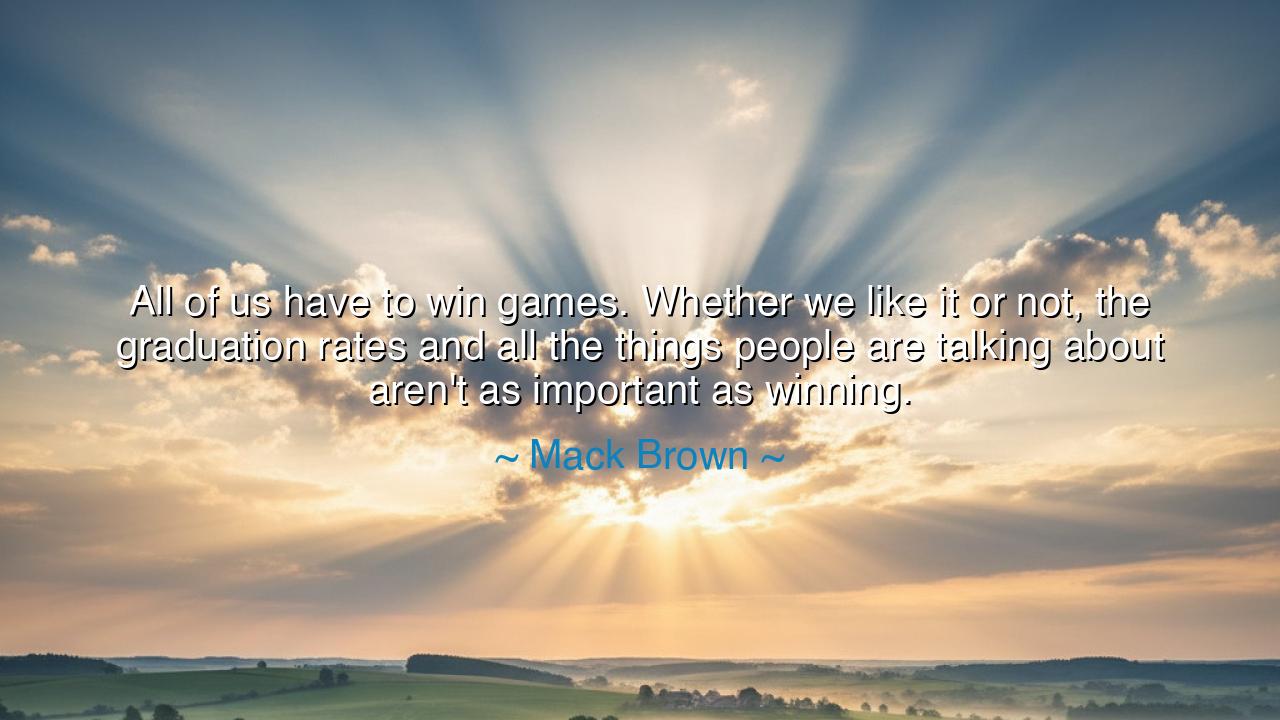
All of us have to win games. Whether we like it or not, the
All of us have to win games. Whether we like it or not, the graduation rates and all the things people are talking about aren't as important as winning.






“All of us have to win games. Whether we like it or not, the graduation rates and all the things people are talking about aren’t as important as winning.” Thus spoke Mack Brown, the celebrated coach of American football, a man who knew the fierce rhythm of competition and the burden of leadership. His words may sound pragmatic, even hard-edged, but beneath their surface lies a deep reflection on the realities of duty, the demands of excellence, and the weight of expectation that presses upon those who stand at the forefront of any great contest. In this statement, Brown is not dismissing the virtues of education or integrity — he is revealing the hard truth of the arena, where results are the measure by which a person’s worth is judged, fairly or not.
To understand his words is to understand the world of the leader — the one who bears both glory and blame. In sports, as in life, victory becomes the language of success. Coaches, generals, statesmen — all are bound by this cruel law of outcome. Mack Brown spoke not as a man exalting shallow triumph, but as one acknowledging that in the eyes of the world, winning defines legacy. The applause of men, the faith of supporters, the trust of employers — all depend on the scoreboard. And thus, whether one’s heart seeks nobler things or not, the battle must still be fought, and fought to be won.
The ancients understood this conflict well. In the Homeric epics, the heroes of Greece did not fight merely for survival — they fought for honor and the eternal flame of recognition. Achilles, though knowing that his life would be short, chose the path of glory over obscurity, saying that it is better to live briefly in light than long in shadow. So too, in the world of competition — athletic, political, or personal — the call to victory remains relentless. Brown’s words are a modern echo of that ancient cry: that to lead is to enter a world where results speak louder than virtue, and where one’s worth is often weighed not in ideals, but in triumphs.
Yet, beneath the iron of his statement, there is also humanity. When Mack Brown says “whether we like it or not,” he acknowledges the sorrow in that truth — that the spirit of the game, the nurturing of young minds, and the moral ideals of education often yield before the storm of public demand. The coach becomes not only a mentor but a soldier, caught between principle and necessity. It is a lament that the world demands results before it honors values — that graduation rates, discipline, and growth are overshadowed by the roar of the crowd. And yet, such is the way of the arena, where ideals are tested in the crucible of competition.
Consider the story of Vince Lombardi, another great coach, who once declared, “Winning isn’t everything; it’s the only thing.” He too was not glorifying greed, but speaking of the spirit that drives men to greatness. Without the hunger to win, without the will to excel, no man — nor team — can rise beyond mediocrity. Lombardi, like Brown, knew that winning is not only about the scoreboard, but about mastery of oneself. To win, truly, is to conquer laziness, fear, doubt, and distraction — to bring forth one’s highest potential. Thus, winning becomes both an outer and inner achievement, a mirror of the discipline that shapes champions.
Still, one must ask: does the pursuit of victory alone make life whole? The ancient philosopher Seneca would have warned against it. “He who wins all things,” Seneca said, “may still lose himself.” There lies the paradox of Mack Brown’s truth — that though the world demands victory, the wise must never forget what victory is for. To win without honor is to hollow the soul; to win at the cost of purpose is to be crowned in ashes. True winning, therefore, must include the invisible triumphs — the growth of character, the resilience born of struggle, the shaping of those who follow.
So, dear listener, hear this teaching: winning is not to be shunned, nor should it be worshiped. It is the flame that drives the athlete, the artist, the worker, and the dreamer — but it must be tended wisely. Do not despise ambition, but let it serve virtue. Strive to win, but let your victories uplift others, not diminish them. Remember that the measure of your life will not only be the games you win, but the people you help to rise, the lessons you leave behind, and the integrity with which you fought.
Practical actions for the seeker: Whatever your field — study, art, or sport — embrace the discipline of winning: prepare diligently, focus your will, and give your all. But also remember to keep balance: honor those who help you, rejoice in effort as much as in outcome, and never forget the values that give victory meaning. Let your pursuit of excellence be both fierce and kind, both relentless and wise. For as Mack Brown teaches, though the world may measure us by our victories, the soul measures us by how we earn them — and it is there, in that harmony of purpose and achievement, that the truest victory is found.






AAdministratorAdministrator
Welcome, honored guests. Please leave a comment, we will respond soon